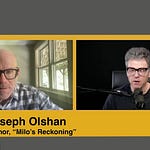The Nineties are back in fashion. Last week on KEEN ON, Terry Anderson explained why the Nineties still matter. Next week, we are featuring a conversation with John Ganz, the author of When the Calock Broke, his interpretation of how America “cracked up” in the early Nineties. Today we feature a conversation with D.W. Gibson, author of the oral history of Seattle’s World Trade Organization protests, One Week to Change the World. As Gibson explains, the June 1999 WTO protests bridge the end of the 20th with the beginning of the 21st century. On the one hand, they are a fitting conclusion to what now appears to be the illusion of Nineties prosperity and stability, on the other, the Seattle protests are an early example of a populist response to economic globalization which climaxed in the Occupy movement a decade later.
DW Gibson is most recently the author of One Week To Change the World: An Oral History of the 1999 WTO Protests. His previous books include the awarding-winning The Edge Becomes the Center: An Oral History of Gentrification in the Twenty-First Century, 14 Miles: Building the Border Wall, and Not Working: People Talk About Losing a Job and Finding Their Way in Today’s Changing Economy. He shared a National Magazine Award for his work on “This is the Story of One Block in Bed-Stuy, Brooklyn” for New York magazine. His work has also appeared in Harper’s, The Atlantic, The New York Times, and The Washington Post. Gibson’s radio work includes co-hosting the podcast There Goes the Neighborhood, guest hosting various news programs for WNYC, and reading original essays for Live From Here as well as NPR’s All Things Considered. His documentary film, Not Working, a companion to the book, is available through Films Media Group. His directorial debut, Pants Down, premiered at Anthology Film Archives in New York. Gibson serves as director of Art Omi: Writers in Ghent, New York, and he co-founded Sangam House, a writers’ residency in India, along with Arshia Sattar.
Named as one of the "100 most connected men" by GQ magazine, Andrew Keen is amongst the world's best known broadcasters and commentators. In addition to presenting KEEN ON, he is the host of the long-running How To Fix Democracy show. He is also the author of four prescient books about digital technology: CULT OF THE AMATEUR, DIGITAL VERTIGO, THE INTERNET IS NOT THE ANSWER and HOW TO FIX THE FUTURE. Andrew lives in San Francisco, is married to Cassandra Knight, Google's VP of Litigation & Discovery, and has two grown children.













Share this post